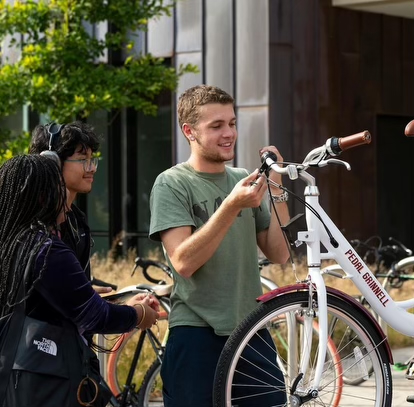Grinnell College Student Spotlight Interview with Bethle Ayele
- Seeds Scholars

- Oct 4, 2024
- 4 min read
Updated: Oct 16, 2024

Bethle Ayele is currently double majoring in Economics and Psychology and she intends to graduate in 2027.
What led to your decision to attend college in Grinnell, IA at Grinnell College?
The decision to come to Grinnell wasn’t fully up to me. I applied to Grinnell through the
Questbridge National Match Scholarship, which I received. When I was ranking schools for the match, I was mindful to rank schools with a small to medium sized student population because it was a priority of mine to have small class sizes, but I also searched for schools with ample resources for students to take advantage of. I generally had no preference besides those two factors, and ultimately needed a school that met my full demonstrated financial need.
Can you describe what kind of support/communities exist for minority students at
Grinnell College? In what ways can a student of Color find her niche at Grinnell College? Feel supported?
I would stress that it is important to find your people wherever you go, and that sometimes
the support/communities you need in a place aren’t fully established yet. In these cases we as student sometimes take on the individual responsibility to create community. In terms of communities that do exist for minority students at Grinnell College, there are student led organizations like our BSU (Black Student Union), ACSU (African Caribbean Student Union), and QPOC (Queer People of Color). These are some of the active organizations on campus made for POC. In terms of physical spaces for minority students to go, Grinnell offers spaces like our Stonewall Resource Center, a safe space serving the LGBTQIA+ community, as well as our BCC (Black Cultural Center), where students can use the many communal spaces as a home away from home. The student center also has a multicultural suite where there are offices for various student affinity groups, and where our professional Intercultural Affairs staff are also housed. In addition, there is an intentional community of Black students living in an off-campus house (right across the street from the College) at Sawubona House. I would also recommend experimenting with any of the campus organizations because although they might not all be for BIPOC students, you never know the different people or the new experiences you might end up enjoying. It’s all about putting yourself out there, and pursuing things that sound exciting to you, and the support from other excited people will pour into you.
What advice do you have for Juniors and Seniors in high school who...
a. ...want to attend Grinnell College in a small town like Grinnell, IA?
I definitely encourage students to consider their needs and values when considering the
place they will live for the next 4 years. If you know you can’t live without Target runs and other conveniences of a big city, then a school “in the middle of everywhere”, like Grinnell, may not be for you.
b. …need significant financial aid?
Grinnell meets 100% of demonstrated need, so its an amazing option in terms of financial aid. Students need to fill out the FAFSA and the CSS Profile, but the pay off is significant since the College does not package student loans in it’s awards. Additionally, there is funding for internships, study abroad opportunities, and research. And, many social activities are free to everyone so you don’t need money for an active social life.
c. …want their application to stand out?
Just be authentic, tell your own story as if you were reciting it to yourself. Its ok to not be sure what you want to do, but you should be sure that you want to grow and Grinnell is possibly the place you’d like to do that.
What are some of Grinnell’s most notable programs? (Programs of study,
extracurriculars, etc).
As a first year, students have an opportunity to apply to GLP (Global Learning Program), a travel embedded course. This means that students can apply for and take a class, in their spring semester of first-year, that will include a chance to travel away from the College during break periods (like spring break and after finals). The classes are super interesting! One was called Global Health Systems and the students traveled to Cuba, Costa Rica, and Denmark. For students with significant financial need (like me) the trip is fully funded! These opportunities extend to upperclassmen, and Grinnell offers a lot of opportunities to study abroad generally in your third-year. But I’m also going to study in London with our Grinnell-in-London program in the spring of my second year! I’d also say MAP (Mentored Advanced Projects), are a great opportunity for students to conduct research over the summer with a faculty member, but even outside of MAP’s, students can apply to outside internships and receive a stipend from the school for their programing. It’s a great place to learn how to create knowledge!
What advice would you offer a student who is considering attending Grinnell
College, but is on the fence about it?
No matter where you go, you will feel a little isolated, a little alone, and sometimes overwhelmed. Those feelings come with adjusting to a new places and experiences, so decide on your future college home based on what you value most for your education.
One word to describe a Grinnell College student?
Canny.











Comments